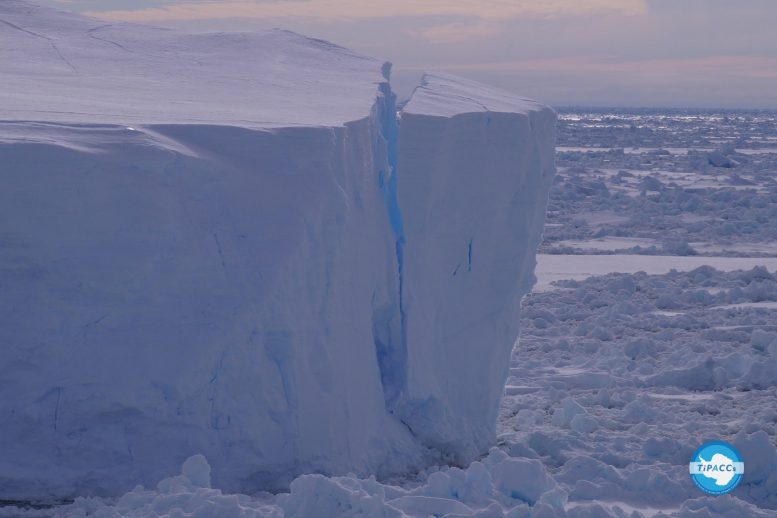
Research from Northumbria University reveals a critical window to prevent irreversible Antarctic ice loss. While current models show no tipping point reached yet, future scenarios suggest possible ice sheet collapse within 300-500 years, highlighting the urgency of addressing climate change. Credit: TiPACC
New research from Northumbria University suggests that there is a limited time frame before irreversible, large-scale ice loss begins in Antarctica.
According to two recent studies from Northumbria University, there’s a limited window of time to prevent large-scale and irreversible melting of Antarctic ice.
These findings, published in The Cryosphere journal, mark the first comprehensive analysis to determine if the Antarctic ice sheet has crossed a threshold of irreversible decline.
The ongoing ice loss in Antarctica has raised concerns that the West Antarctic ice sheet might already be destabilized and ‘past the point of no return’.
However, researchers have now systematically analyzed this question and found there is no evidence that it has already reached its tipping point.
Modeling Studies Offer Hope
The modeling study – carried out by Northumbria University and several research institutions across Europe – used three different computer models to run a series of simulations to conduct a thorough inspection looking for signs of irreversible retreat of the Antarctic ice sheet in its present form.
Authors of the study say whilst ice loss in Antarctica will continue in the future, these results give slight hope that it might still be possible to avoid or delay crossing the tipping point, if urgent action is taken.
Dr Emily Hill, Research Fellow at Northumbria University and report co-author, said: “The implications are profound. We used three different numerical models which all showed that we have not yet crossed a tipping point that leads to irreversible ice loss in Antarctica.
“Using several models makes our findings even more convincing, and it is reassuring to know that we haven’t yet passed the point of no return.”
Potential Future Scenarios
However, the researchers also ran hypothetical simulations to investigate how the ice sheet might evolve if current climate conditions stay as they are. They found that even with no additional global warming, an irreversible collapse of some marine regions of West Antarctica’s ice sheet is possible in the future.
One of their models shows the earliest that this could happen is within 300-500 years under current conditions, warning that accelerating climate change is likely to shorten this timescale further.
Global Implications of Antarctic Ice Loss
Antarctica’s ice masses store enough water to raise sea levels by several meters around the globe and remain one of the greatest uncertainties in future projections of the effects of climate change.
Dr Ronja Reese, Vice-Chancellor’s Fellow at Northumbria University and report co-author, said: “Accelerated ice loss at the margins of the ice sheet could signal a collapse of larger marine regions. Our experiments show that an irreversible collapse in some marine regions in West Antarctica is possible for the current climate conditions.
“Importantly, this collapse is not happening yet, as our first study shows, and it evolves over thousands of years. But we would expect that further climate warming in the future will speed this up substantially.”
The research forms part of a major £4 million EU-funded study on Tipping Points in Antarctic Climate Components (TiPACCs) bringing together experts from the UK, Norway, Germany and France to investigate the likelihood of abrupt changes in the movement of ice in the Antarctic region.
Petra Langebroek, Research Director at the Norwegian Research Centre (NORCE), and Scientific Coordinator of the European TiPACCs Project, said: “I am very proud to see this work published. This tight collaboration across different European institutes has resulted in major progress in our understanding of Antarctic ice sheet stability and tipping points.
“This is somewhat good news. We have not yet crossed these tipping point in Antarctica, which – in theory – means that the ongoing ice loss can be reduced or even stopped. Unfortunately, our research also shows that with ongoing climate change, we are headed to crossing tipping points in West Antarctica.”
Northumbria University is home to one of the world’s leading groups in the studies of the interactions between ice sheets and oceans. The team of researchers are working to explore the future of ice sheets and glaciers worldwide in a warming world. This involves understanding the causes of ongoing changes in Antarctica, Greenland, and alpine areas, as well as assessing future changes and resulting impacts on human environments globally.
References:
“The stability of present-day Antarctic grounding lines – Part 2: Onset of irreversible retreat of Amundsen Sea glaciers under current climate on centennial timescales cannot be excluded” by Ronja Reese, Julius Garbe, Emily A. Hill, Benoît Urruty, Kaitlin A. Naughten, Olivier Gagliardini, Gaël Durand, Fabien Gillet-Chaulet, G. Hilmar Gudmundsson, David Chandler, Petra M. Langebroek and Ricarda Winkelmann, 7 September 2023, The Cryosphere.
DOI: 10.5194/tc-17-3761-2023
“The stability of present-day Antarctic grounding lines – Part 1: No indication of marine ice sheet instability in the current geometry” by Emily A. Hill, Benoît Urruty, Ronja Reese, Julius Garbe, Olivier Gagliardini, Gaël Durand, Fabien Gillet-Chaulet, G. Hilmar Gudmundsson, Ricarda Winkelmann, Mondher Chekki, David Chandler and Petra M. Langebroek, 77 September 2023, The Cryosphere.
DOI: 10.5194/tc-17-3739-2023
Watch this video to learn more about the TiPACCSs study into tipping points in Antarctica.









No, climate alarmists, nothing is needed besides staying out of nature’s way.
This has been going on long before man got here and will continue to do so long after we’ve left for other worlds. So just shut it and watch nature do what nature does best – evolve!
“… the first comprehensive analysis to determine if the Antarctic ice sheet has crossed a threshold of irreversible decline.”
The first question that needs to be answered is whether any physical Earth process is truly irreversible. With at least 4 Pleistocene glacial stages, and their associated interglacials, it is obvious that Earth can, and does, recover from glacial declines. Fortunately, for civilization, we are currently experiencing a warming interglacial almost equal to the Eemian interglacial stage.
The next question that needs to be answered is, “Why, if melting is a result of an increasing well-mixed gas, Western Antarctic is seeing a loss of ice, but Eastern Antarctica isn’t?”
Stopped reading at “the modeling studies”. No science to see here, moving on.